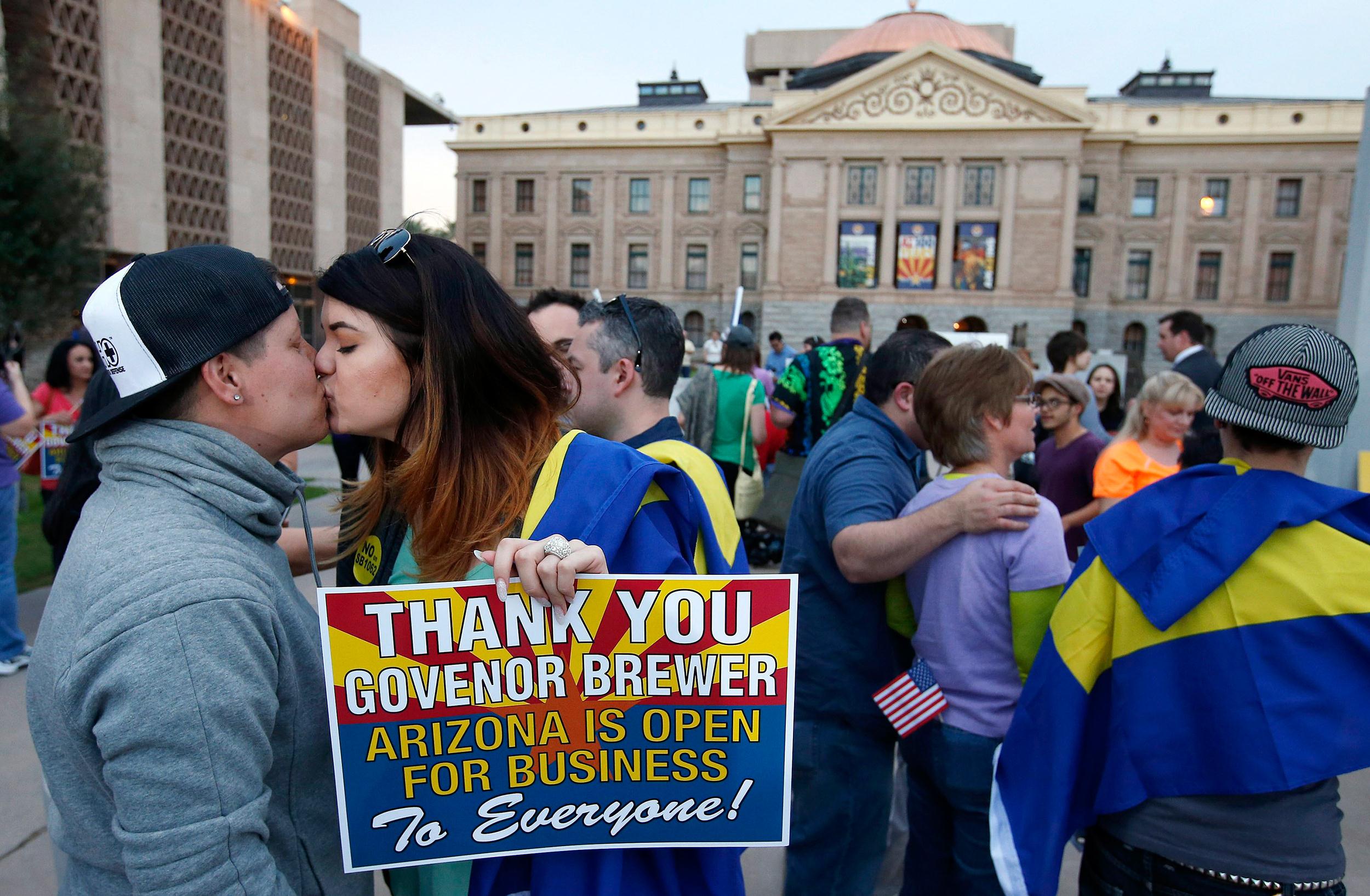Governor Brewer’s veto of Arizona’s controversial “turn the gay away” bill isn’t as big of a victory as you might think.
As many Americans cheered the demise of Arizona’s controversial “license to discriminate” bill, one thing seemed lost on the media, in progressive circles, and even among many LGBT activists: Even with Governor Jan Brewer’s (R-AZ) veto yesterday, businesses in a majority of Arizona cities still have the legal right to discriminate against LGBT people.
If passed, SB 1062 would have afforded business owners the right to refuse service to patrons that identify as LGBT based on those owners’ religious beliefs. Accordingly, SB 1062 is part of a broader pattern of dangerous “religious freedom” bills being proposed throughout conservative statehouses in the US. In this respect, the defeat of SB 1062 is something to celebrate, as anti-gay legislators in other states will think twice before introducing similar legislation that sanctions LGBT discrimination behind the guise of “religious freedom.”
However, most activists are celebrating yesterday’s veto as if SB 1062 would have stripped all Arizonans of nondiscrimination protections they currently enjoy under state law. This is far from the truth.
Looking broadly, US federal law currently affords no legal protections against discrimination on the basis of either sexual orientation or gender identity. While an alarming nine out of ten Americans believe laws like the Employment Non-Discrimination Act already exist, the cold hard truth is that under the law of the land in the United States, it’s perfectly legal to deny someone employment, refuse someone service, or kick someone out of their apartment simply because they are LGBT.
Where federal policymakers have failed to enact comprehensive LGBT nondiscrimination legislation, a number of states have filled the void with nondiscrimination laws that provide LGBT people protection in employment, housing, and public accommodations. However, fewer than half have done so. Or put another way, in a majority of states—states like Arizona—LGBT people have no protections against discrimination under state or federal law.
It’s true that in Arizona, the Cities of Phoenix, Scottsdale, Tempe, Tucson, and Gilbert have municipal ordinances that afford their LGB citizens some protections against discrimination (Phoenix, Tucson, and Tempe also afford protections to transgender citizens). Signing SB 1062 into law would have invalidated these cities’ ordinances, which according to US Census data account for 2.6 million people, or 40% of Arizona’s total population. In this light, the defeat of yesterday’s bill was certainly a huge victory in maintaining these important protections.
However, the bill’s defeat legally changes nothing for LGBT people living in the remaining cities accounting for 60% of Arizona’s population. If SB 1062 had been passed into law, businesses could legally turn away LGBT customers. But even today without SB 1062, businesses can still turn away LGBT customers in the 86 Arizona municipalities that do not have any LGBT protections on the books. And doing so is completely legal. Nevertheless, this distinction seems lost in the media and among LGBT activists.
There is a lot to celebrate with SB 1062’s veto. The massive opposition to this bill is one more indicator of the huge cultural shift we have made as a country, a shift away from bigotry and towards fairness and inclusion of LGBT people in our society. Moreover, the groundswell of opposition to the bill included Arizona’s two republican senators, Fortune 500 companies, and even many of the Arizona state legislators that voted for the bill in the first place.
The defeat of this bill is a significant symbolic victory for the LGBT movement. And as mentioned earlier, it’s a significant legal victory for LGBT Arizonans living in cities like Phoenix where they are afforded some protections against discrimination.
And yet despite these victories, the controversy that was SB 1062 was a missed opportunity. It was a missed opportunity to have an important conversation about the lack of legal protections afforded to LGBT Americans in this country. While marriage equality is on the march both in the courts and in the statehouses, legislation outlawing discrimination against LGBT people has stalled. To change that, we need to acknowledge that those laws don’t even exist in the first place.
So yes, in many ways yesterday’s veto was something to celebrate. But while LGBT Americans today celebrate the defeat of anti-gay bills such as SB 1062, they also await the passage of state and federal laws that would positively provide them the protections they deserve but currently lack. This means, for example, Congress finally passing comprehensive protections for LGBT Americans such that all people are protected against discrimination, regardless of the state where they reside. Now, that would be something to celebrate.

